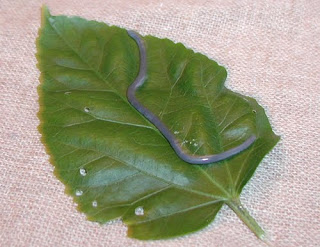- Pythonide
- Typhlopidae
- Xenopeltidae
- Acrochordidae
- Uropeltidae
- Colubridae
- Elapidae
- Hydophiidae and
- viperidae
The Typhlopidae are a family of blind snakes. They are found mostly in the tropical regions of Africa, Asia and the Americas. The rostral scale overhangs the mouth to form a shovel like burrowing structure. The eyes are covered with scales and teeth occur in the upper jaw. The tail ends with a horn like scale. Most of these species are oviparous. Currently, 6 genera are recognized containing 203 species.(source Wikipedia)

Brahminy Blind Snakes(Pics From Coastal Plain Reptiles By Scott Mathew Quint)
The Xenopeltidae are a Monotypic family of snakes created to the genus Xenopeltis, which is found in Southeast Asia. Its members are known for their highly iridescent scales. Currently, two species are recognized and no subspecies. (Source Wikipedia)
The Acrochordidae are a Monotypic family created for the genus Acrochordus. This is a group of primitive snakes found in Australia, Indonesia and Borneo. Currently, 3 species are recognized. (Source Wikepedia)

Little File snakes (Pics from abdn.co.uk)
The Uropeltidae are a family of primitive burrowing snakes found in southern India and Sri Lanka and South East Asia. The name is derived from the Greek words ura ("tail") and pelte ("shield"), indicating the presence of the large keratinous shield at the tip of the tail. Currently, 8 genera are recognized comprising 47 species.(Source Wikipedia)
 Red-Tailed Pipe Snake (Pics From EcologyAsia.com)
Red-Tailed Pipe Snake (Pics From EcologyAsia.com)A colubrid (from Latin coluber, snake) is a snake that is a member of the family Colubridae. It is a broad classification of snakes that includes about two thirds of all snake species on earth. Colubrid species are found on every continent, except Antartica.(Source Wikipedia)
Striped Kukri Snake( Pics from EcologyAsia.com)
- painted Brozeback
- Common Malayan Racer
- Orange-Necked Keelback
- Paradise Flying Snake
- Oriental whip Snake
- And many More, Will updates when I found more to fill.
- Banded krait
Hydophiidae are family of Sea snakes, or seasnakes, are Venomous elapid snake that inhabit marine environments for most or all of their lives. Though they evolved from terrestrial ancestors, most are extensively adapted to a fully aquatic life and are unable to even move on land, except for the genus Laticauda, which retain ancestral characteristics which allow limited land movement. They are found in warm coastal waters from the Indian Ocean to the Pacific. All have paddle-like tails and many have laterally compressed bodies that give them an eel -like appearance. However, unlike fish, they do not have gills and must come to the surface regularly to breathe. Nevertheless, they are among the most completely aquatic of all air-breathing vertebrates. Among this group are species with some of the most potent venom of all snakes. Some have gentle dispositions and bite only when provoked, but others are much more aggressive. Currently, 17genra are described as sea snakes, comprising 62 species.(source Wikipedia)
- Amphibious Sea Snake
- Common Beaked Sea Snake
- Pelagic Sea Snake
- Short Sea Snake
- Yellow-Bellied Sea Snake
The Viperidae are a family of venomous snakes found all over the world, except in Australia, New Zealand, Ireland, Madagascar, Hawaii and the Artic Circle. All have relatively long hinged fangs that permit deep penetration and injection of venom. Four subfamilies are currently recognized.(Source wikipedia)
In Borneo, They are more Unknown Snakes in the wild, that have not been found and study yet, Generally speaking, it best to leave them alone, If you not sure whether the species venomous or Not, Still I say best to leave them alone rather than trying to catch them, you wont Know what will happen to you, better avoid than sorry, if snakes had enter you house or your house compound, my 5 cents advice, call the expert or call the fire department for the removal of the snake. And finally if I miss to list some snakes, Please comment below, will update as soon I read it.










No comments:
Post a Comment